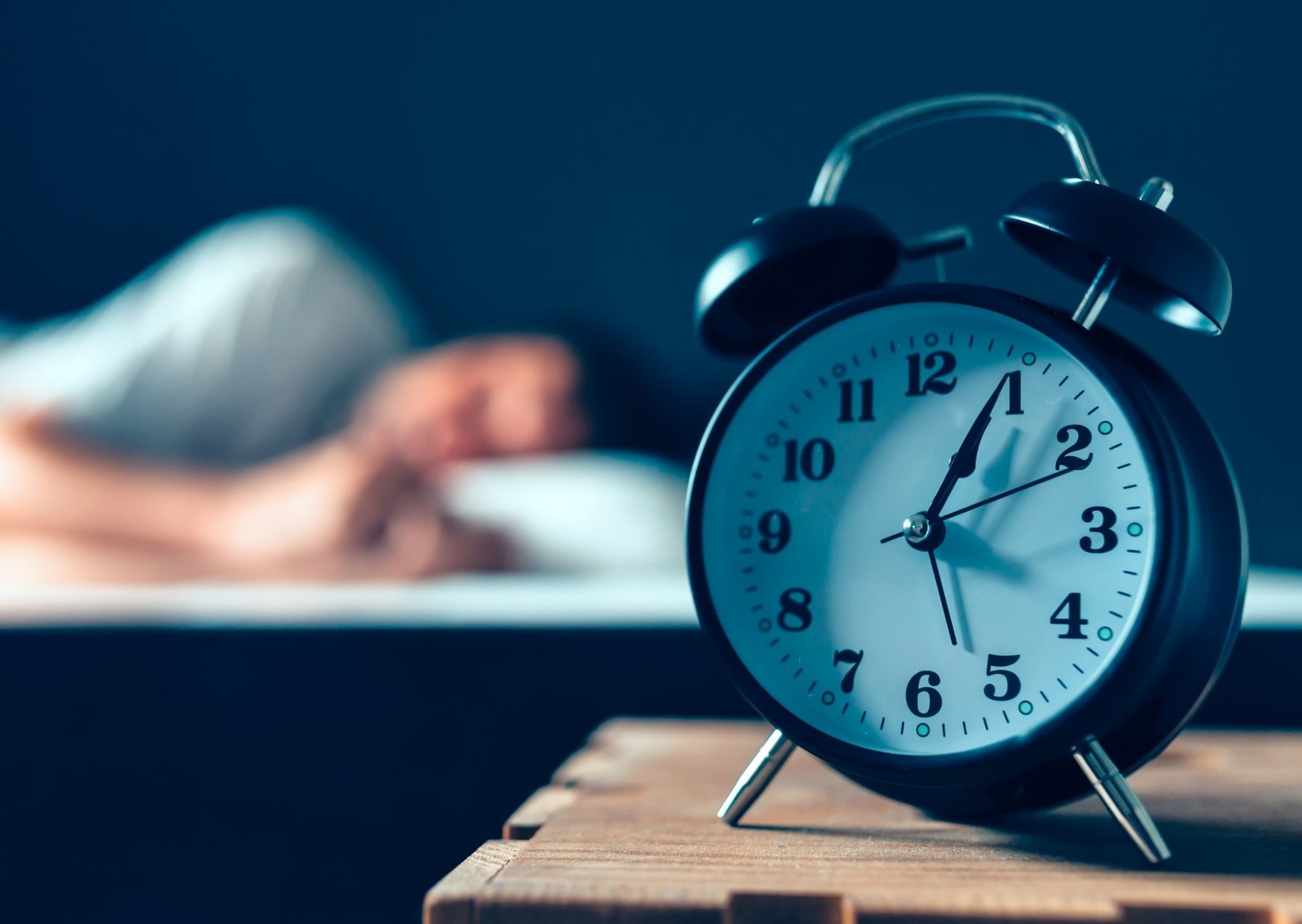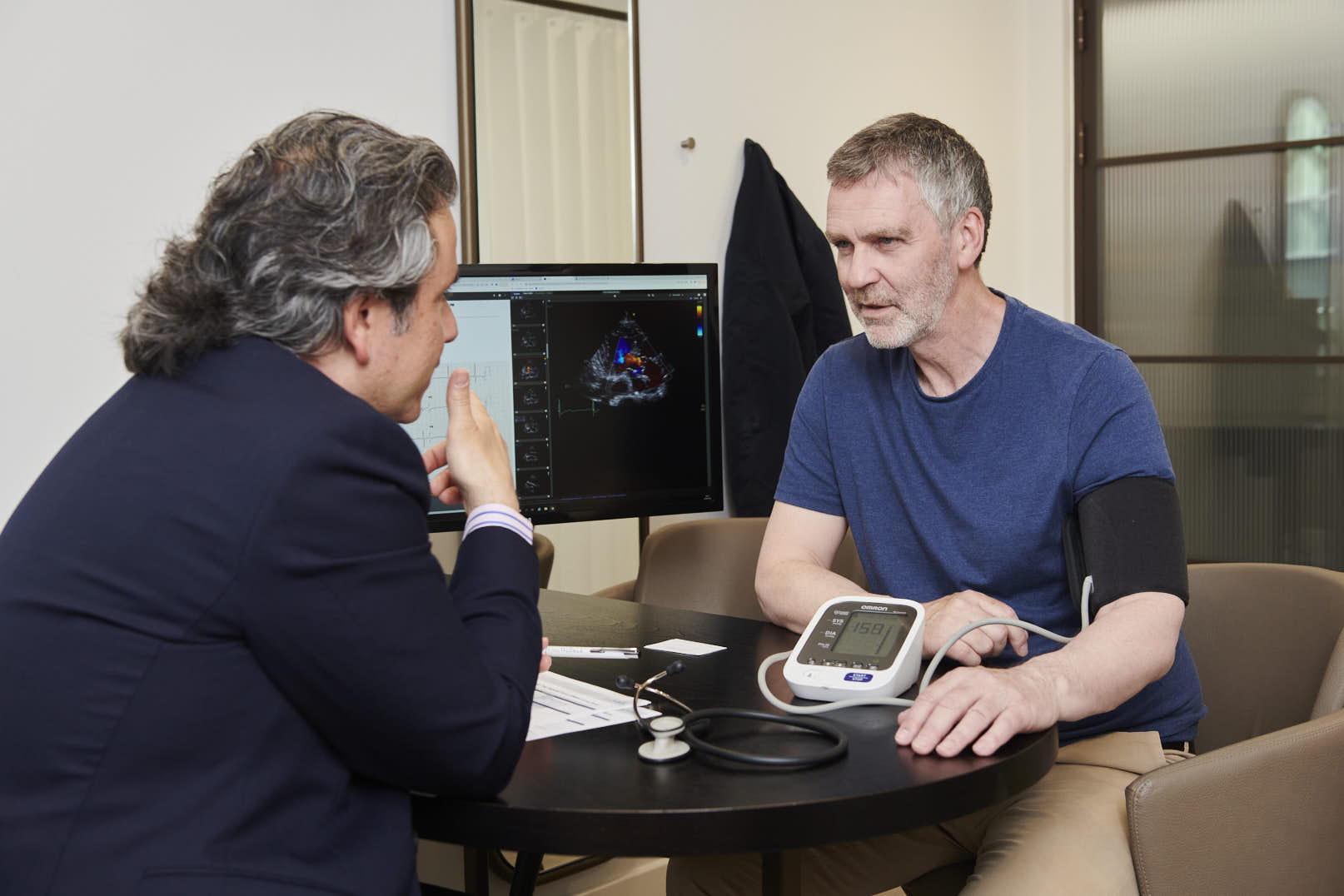No doctor referral needed in order to book this service, although health insurers may require a referral in order for your treatment to be covered.
Private At-Home Sleep Study
An at-home sleep study is a way of monitoring your sleep to diagnose any sleep disorders. You’ll wear a device overnight that tracks your breathing, heart rate, and other data points.

What is an at-home sleep study?
An at-home sleep study is a way of monitoring your sleep overnight from the comfort of your own home. The study tracks data points such as your brain activity, heart rate, muscle tone, eye movements, and breathing patterns while you sleep.
The results can help our experts diagnose and manage sleep disturbances and disorders, including sleep apnoea, insomnia, snoring, irregular breathing patterns, and excessive daytime tiredness.
Sleep disturbances are very common, affecting around 1 in 3 people in the UK at some point in their lives. They can cause multiple lifestyle problems and lead to several serious health conditions if they’re left untreated.
At Welbeck, our at-home sleep study service is managed by specialists in our Sleep Centre. They’ll identify any medical sleep disorders and ensure you see the appropriate specialist to help you manage your symptoms. We have multispecialty expertise with leading experts in the sleep field working across respiratory, neurology, cardiology, and ear, nose, and throat.
Paediatrics
We offer appointments to paediatric patients aged 12 to 18. For full information on our paediatrics service, please visit our main Paediatrics page.
What does an at-home sleep study involve?
If you’re experiencing sleep issues, the first step is to receive a consultation. Your consultant will ask you about your symptoms and medical history, and they may conduct a blood test.
With this information, they’ll recommend an at-home sleep study that’s appropriate for you. The study can be taken in your own home over the course of 1 night. You’ll be given a full demonstration of how to set up and use the equipment beforehand. You’ll be able to choose whether to collect the equipment or have it delivered and set up for you.
On the night of the study, you’ll be asked to stick to your normal bedtime schedule and go to sleep as you would any other night.
Your at-home sleep study may involve:
Sunrise test
The Sunrise test is used in the evaluation of obstructive sleep apnoea (OSA). The non-invasive digital solution comprises a sensor, a smartphone app, and data analysis software. During sleep, the Sunrise sensor is worn on your chin and records mandibular movement (MM). Analysis of the collected data generates a detailed report, which is used by our sleep specialists to identify specific breathing patterns associated with sleep-disordered breathing.
NOX T3 study
A NOX T3 is a small device that you clip to your chest. It then connects to a cannula (small tube) that you insert into your nose and an oxygen SpO2 probe that you attach to your finger. It records data, including how effectively you breathe throughout the night. It can help to determine the cause of snoring and detect various sleep disorders, including sleep apnoea, periodic limb movement disorder (PLMD), and restless leg syndrome (RLS).
TOSCA Study
A TOSCA sleep study is an overnight test that’s performed on a single night (or perhaps multiple if your clinician requests this) to measure transcutaneous carbon dioxide (tcpCO2) levels in your blood. It’s performed as a 'home study', which is supported by a member of the Welbeck team, who'll go to your home address (if within a reasonable distance from Welbeck) to set up the study, then return in the morning to collect the equipment. The results of the test are reported by a specialised sleep physiologist and interpreted by the referring (or sleep) clinician.
In some cases, the TOSCA study and NOX T3 study can be combined for a one-night sleep study.
Polysomnography study
A polysomnograph, also called a neurological sleep study, involves the use of disc electrodes and sensors attached to various parts of your body to record electrical brain activity, eye movements, heart rate, muscle activity, breathing pattern and oxygen level in your blood. You’ll also be given a video camera to capture any movements or sounds you make while you sleep. You may be asked to fill in a sleep diary in the morning.
SleepImage
SleepImage is an at-home sleep assessment system that uses a small wearable finger sensor to measure heart-rate patterns and breathing while you sleep. The data it collects is analysed using a method called cardiopulmonary coupling to evaluate sleep quality, detect possible sleep-disordered breathing (such as sleep apnoea), and track changes over time. It provides clinicians with clear metrics — like a Sleep Quality Index and an apnea-hypopnea estimate — offering a convenient alternative to in-clinic sleep studies.
WatchPat
WatchPAT is another at-home sleep-testing device, which uses a wrist sensor, finger probe, and small chest sensor to measure signals like peripheral arterial tone, oxygen levels, heart rate, snoring, and body position during sleep. It’s used in identifying disrupted breathing events and provides information about sleep stages and your overall sleep quality. It’s a simple, non-invasive alternative to an overnight in-clinic study for diagnosing conditions like obstructive and central sleep apnoea.
How to prepare for an at-home sleep study
You’ll be able to take any medication as normal unless your consultant advises you otherwise. However, you may be asked to avoid taking a nap and consuming caffeine and alcohol for a period of time before the study.
Depending on the type of sleep study you’re having, you may need to wear or remove certain items of clothing so you can attach the device to your body. Your consultant will give you detailed instructions beforehand.
Recovery and aftercare
You can resume your normal activities once your sleep study is complete and you’ve disconnected the devices.
We’ll collect all equipment from you and analyse your results within 48 hours to 5 days, depending on the type of study.
Your consultant will put together an overnight sleep report and go through this with you in detail during a follow-up appointment. They’ll use the results to determine whether you need further tests or can begin a treatment plan.
Treatment options may include using a device when you sleep or being referred to another sleep specialist for more detailed investigations.
How much does a private at-home sleep study cost?
Please contact our Sleep Centre for pricing information.
Why choose Welbeck?
At Welbeck, our sleep specialists are experts in their field and are dedicated to providing world-class care to every patient.
With access to colleagues across other specialties, our consultants are also able to refer within the Welbeck ecosystem if required to ensure you receive the treatment you need as quickly as possible, all under one roof.
All appointments, testing, treatment, and follow-up appointments take place within our state-of-the-art facilities, enabling us to deliver accurate diagnostics and advanced treatments.
Booking a private at-home sleep study
To book an at-home sleep study, you must be referred by either your GP or a sleep specialist following a consultation with them. Self-referrals are not accepted for this test.
If you would like to schedule a consultation with a sleep specialist, please get in touch to make an appointment. Your health is important to us, so we strive to offer same-day appointments whenever possible.
Our consultants are recognised by the major health insurance companies. If you have private health insurance, your treatment at Welbeck can begin once you have obtained authorisation. We also provide care to self-paying patients. Learn more about the different payment options at Welbeck.
FAQs
What happens if sleep apnoea is untreated?
It’s vital to seek treatment for sleep apnoea. Untreated, it can lead to serious health conditions, including cardiovascular diseases (that affect your heart and blood vessels), stroke, and metabolic disease.
How accurate is the NOX T3 device?
One 2023 study found that the NOX T3 device accurately identified swallow events (every time a person swallowed while asleep) with a sensitivity of 95% and a specificity of 99%.
What are the signs of a sleep disorder?
If you have a sleep disorder, you may:
- feel very tired or fall asleep during the day
- struggle to fall asleep
- wake up during the night
- wake up too early
- have an uncontrollable urge to move when you’re falling asleep
- sleepwalk
- wet the bed
What are the benefits of an at-home sleep study?
At-home sleep studies are less expensive than studies conducted in a clinic. They’re also more convenient and less time-consuming for you.
Sleep Specialists at OneWelbeck
Cardiology
sleep specialists
Many of our cardiology consultants cover sleep issues as well. Click the button to find out more about our Heart Health team and find a consultant.
Our Team



